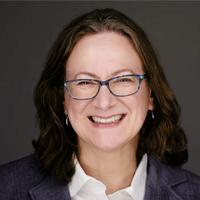Peter Wildy Prize Lecture 2021: Dr Elisabeth Bik

Dr Bik began her talk by addressing her virtual audience and stating that she was thrilled and honoured to be delivering the Peter Wildy Prize Lecture 2021 at Annual Conference. Presenting her Lecture from California, Professor Bik spoke about her surprise at being nominated stating that she had “made her career out of criticizing other scientists on Twitter, including plenty of microbiologists”, but that she was thrilled to have been recognised for her work promoting microbiology papers and educating others about science integrity.
Speaking about the early stages of her career, Professor Bik relayed how she first became a research assistant and later completed her PhD at the Dutch International Institute for Health and Utrecht University in The Netherlands. Upon completing she then went on to work in a clinical lab at the St Antonia’s Hospital in Nieuwegein where she applied her love of microbiology and in particular pathogen detection and string typing to patient specimens.
Moving to the United States in 2001, Professor Bik joined the lab of Professor David Welman at Stanford University where she spent 15 years working on the microbiome of humans, sea lions and dolphins. Later she outlined how she moved to work in the private sector, at two microbiome start-up companies uBiome and Astarte Medical.
Throughout her career, Professor Bik has developed an interest in science outreach, social media, scientific publications and research integrity. Hence in 2019, she decided to become her own boss, leading her to become a science volunteer and occasional consultant in research integrity.
Continuously fascinated by how scientists communicated with one another, leading scientific research to thrive, Professor Bik then described the different ways in which scientists have communicated with each other over time. From paper publications to the internet, the world of scientific communication had evolved, with the potential to reach a wider audience. It was then that the opportunity to write her own blog post presented itself, thanks to Professor Jonathan Eizen, a microbiologist at the University of Davis, California, USA who writes the MicroBE.Net blog. For two years Professor Bik wrote blogs and discussed microbiology to an audience that were not necessarily all scientists.
By this stage of her career, Professor Bik was also doing a lot of science outreach work for Taste of Science, San Francisco where she talked about various scientific topics to different audiences. Venues ranged from museums to pubs and high schools; she also spoke about hosting job shadowing events where high school students could come to labs and go through how everything was run on a day-to-day basis.
This led to her setting up her own blog, Microbiome Digest, focused on writing about new scientific papers that came out in the field of microbiome research. She ran the blog on a daily basis for almost three years and it is now curated by a team of 30 volunteers, and it gets between 200—500 page views every day.
To compliment her blog, Professor Bik decided to also set up a Twitter account @MicrobiomDigest. She discussed building up her audience over time, by engaging with others working in the field of microbiome research and used her connections with the MicroBE.Net guest blog posts to build up her profile. Using a range of different topics, from tweeting about new studies, live tweeting at conferences, post-publication peer review and science integrity concerns, her Twitter saw a significant increase in her number of followers.
Professor Bik then spoke about why the integrity of scientific publications is so important to her, stating that if she sees a publication that has an error, this should be flagged or discussed more openly. Continuing, she outlined that science is not exempt from fraud and there are often very few repercussions for things like plagiarism, falsification and fabrication. Using her expertise of identifying duplications in patterns, Professor Bik then went on to present various examples of where images had been duplicated and described how her findings led to her publishing a paper in the American Society for Microbiology, titled ‘The prevalence of inappropriate image duplication in biomedical research publications’ where she found that 782 papers (of 20,621) had duplicated figures.
Finally, Professor Bik concluded by speaking more about the highs and lows of working on social media. Speaking about the positives, she went on to say how there is a real sense of community amongst scientists and their research, however, there have also been setbacks – internet trolls and hate tweets when it comes to researchers having their work critiqued. Reflecting on research integrity, she stated that peer review is not enough when it comes to concerns relating to research integrity, that at times there are conflicts of interest when it comes to addressing papers that have already been published and some institutions may not want to question the integrity of a researcher.
Concluding her presentation Professor Bik stated that she hoped we would leave the talk with a “glimmer of hope” that most science should still be trusted, though we should remain aware of science misconduct. She stressed that there are many others who care about science integrity and paid tribute by dedicating her award to their ongoing work.
To learn more about Dr Elisabeth Bik’s work read our recent Q&A online.
You can view Dr Bik's full Prize Lecture below.
